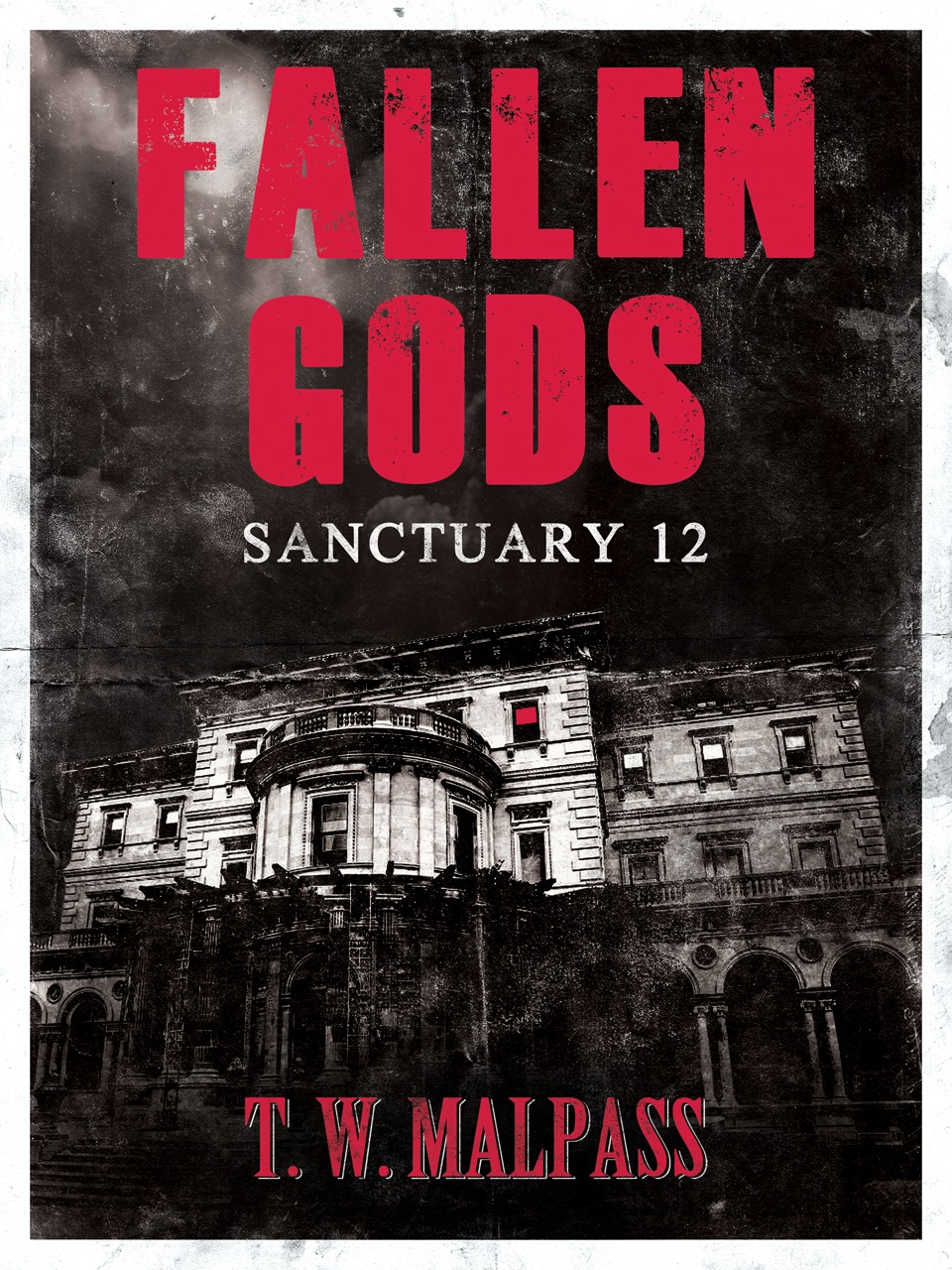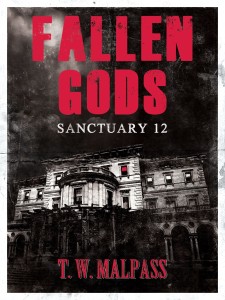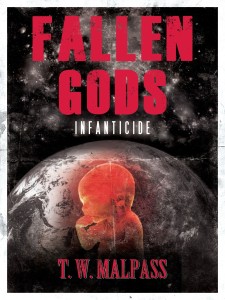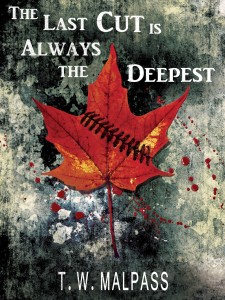Interview – Fallen Gods Saga author, T.W. Malpass
Self-Publisher’s Showcase: Today we are joined by T.W. Malpass, author of the SANCTUARY 12 and INFANTICIDE, books 1 and 2 of The Fallen Gods Saga. Welcome to the Showcase Lounge, Tim. Please do make yourself comfortable.
T.W. Malpass: Thanks. I’m suitably comfortable.
SPS: Before we talk about your work, can you take a moment to tell us a little bit about yourself?
TWM: Sure. I’m 38 and I’ve lived in Staffordshire, England all of my life. I’m an avid horror fan. I love horror literature. King and Barker are my favourites, but I also pay attention to the classics. I have been known to read Lovecraft aloud after midnight. My biggest passion is horror cinema. Put it this way, I’m the guy you want on your side if the subject comes up in a pub quiz. I regularly attend the Frightfest film festival in London, and I’ve met some crazy people there. Argento was one of the craziest. I never dreamed I would meet such a master of the macabre. I recently had a lovely chat with Luke Evans, who is due to shoot to fame in the new Hobbit movie.
SPS: Can you pinpoint a moment where you first realised you wanted to write and publish, or was it more of a gradual process?
TWM: It was much more gradual. I think it progressed with my development into an adult. I’ve always loved to write stories, to create other worlds and characters. Some of my teachers as a child first realised I possessed that urge to write, and later on in high school one of my teachers, Mr Jones, really encouraged me to develop my talent. I didn’t really heed her advice straight away of course. I was far too busy trying to be the big man and chasing girls. I attempted to get back into writing again in my late teens, but I just wasn’t mature enough to handle the required levels of discipline. I only really made the decision to write seriously in my late twenties. It felt revelatory, as if it was the one thing that had always been missing from my life ever since I was a child, like returning home. I know that sounds awfully melodramatic, but I am a writer after all.
SPS: The idea for your Fallen Gods Saga came from your love of 70’s and 80’s horror. Can you let us in on your personal favourites from that time, or would we be here all day?
TWM: Haha. We could be here all day, but I’ll lessen the pain for you by mentioning directors and writers instead of individual books and movies. I’ve been obsessed with Romero’s earlier work, John Carpenter, and some of the Italian Giallos from masters like Dario Argento. I did mention King and Barker already. Novels like The Stand, It, The Books of Blood and Cabal had a massive affect on me and made me realise what fascinating doors horror could open. Oh, I should mention Nicolas Roeg’s Don’t Look Now. A movie so perfect, it makes me weep. Ok, that’s it, I’ll leave it there.
SPS: Sanctuary 12, the first book in the saga deals with nine complete strangers. How did you find weaving such a large main cast into the story?
TWM: Believe me, if I’d known what I was getting into beforehand I never would have started it. Because of how the story was structured, I decided to write the storylines for most of the characters separately. Once they were finished I storyboarded everything like you would with a movie and then made decisions on how the individual stories would be interwoven before the characters eventually crossed paths. It sounds fun when I explain it like that, but it was more of a nightmare.
SPS : Was there a particular character that you enjoyed creating more than the others?
TWM: There are so many heroic characters in the Fallen Gods Saga, but I’m most fond of the real putrid scab of the series – the creature, Clover. It would be a mistake to call it a villain. It’s more of a victim of circumstance, a golem in the true sense of the word – the result of a cerebral vomit containing all the negative emotions purged from someone’s mind. Clover represents all of the things we despise about ourselves. When we shudder at our own weakness and decide to disappear up our backside, we would probably find Clover looking back at us. I like the creature so much because it is a very real slice of human nature, something that exists inside all of us. In many ways, Clover also possesses a genderless quality, which is something I find fascinating.
SPS : “Vladimir Volanov can get inside your head by eating the one thing you can never escape from” Now that has us intrigued. Care to expand on Vladimir?
TWM: I have a soft spot for Vladimir, although he is a hard character for readers to root for. He comes from a very murky background in Moscow. He is the product of one of Russia’s biggest crime families, who has rejected his heritage to pursue a life of self destruction. The problem with people who feel no self worth is they usually end up hurting the people they need the most. He is definitely the outsider of the group. But back to what caused you to ask me about him. Vladimir has the ability to possess the bodies of others, and he does this by consuming their shadows, hence the little tagline I designed for him. His ability does come in handy from time to time.
SPS: Was the idea always to produce a trilogy, or was it originally just to produce a standalone novel?
TWM: I never envisaged writing a book series for my first serious novel. It did begin with the idea of producing a standalone urban fantasy after listening to the song, Don’t Fear, by the Blue Oyster Cult. The theme and the question was always, what would it take for a person to transcend the fear of death? Then I saw a documentary narrated by the actor Gabriel Byrne called, Flight From Death. It focussed on the theory that the immortality myths we create to deal with our innate fear of death are the reason for all human conflict and suffering. It was such an intriguing idea I decided that I would try to create my own immortality mythology, and that’s how the book series really evolved.
SPS: The second book in the saga, Infanticide, really picks up the pace. Is it a case of just more action now that the characters are familiar to the reader, or is it consciously building towards a climactic conclusion?
TWM: All three books are obviously a continuation of the same story, but each one is its own beast in terms of tone and pace. I didn’t really plan it. It just seemed to happen that way. The plot as a whole had natural separation points. Infanticide is considerably shorter and faster in pace than Sanctuary 12, and book 3, Mind Over Matterless, is almost the size of book 1 and 2 combined and has its own identity. I would say that Sanctuary 12 plays out more like a mystery and has a great deal of exposition, so it was always going to be the most ponderous of the three.
SPS: The fallen gods’ nemesis, Mr Cradleworth, is really upping his game. Can you tell us a little about him and his past?
TWM: Charles Cradleworth was once a man. In 1936 he lived a very normal life as a stock broker with his wife and two children. He was your quintessential English gentleman, until something happened to him. He was taken by an ancient power for a specific purpose. I can’t say too much, as I don’t want to spoil some of the reveals in Sanctuary 12. I would describe Cradleworth as a force of nature, without conscience or wonderment. I based him on two very different sources – Stanley Kubrick’s Alex from A Clockwork Orange and Mark Twain’s The Mysterious Stranger. I wanted to show omnipotence with a quintessentially English attitude.
SPS: Once the trilogy is complete do you plan to close the door on the saga, or is there potential for more in the future?
TWM: From very early on, I always knew how the trilogy would end. It conveniently leaves enough there to revisit that world for a standalone, or not, as the case may be. I’m open minded about going back, but I started this journey in November 2007 and the trilogy won’t be finished until well into 2014, so I don’t intend to consider it for a good while.
SPS: For those looking more for some dark and broody romance you have written a novella, The Last Cut Is Always the Deepest. What can we expect?
TWM: Certainly something different from the Fallen Gods Saga. It’s far more contemporary and non-supernatural. It’s essentially a domestic drama with some suspense. I guess my horror roots do come through in some of the imagery and the tone of the piece.
SPS: How did you find writing in the Romance genre, and is this something you could see yourself repeating?
TWM: I loved it. I found it liberating. It is something I plan on returning to. In fact, one of my next projects is a full length, young adult romance novel. Apart from horror, my favourite genre is drama. I approach my romance more from the angle of drama. I love watching young people in love. The love you feel as a teenage can never be recaptured, that freshness of knew experience is utterly enchanting.
SPS: Did you start off looking at producing a novella or was it just a wait and see approach to the length?
TWM: Absolutely the former. The Last Cut was a direct response to the way I was feeling after spending the best part of five years writing the first books of Fallen Gods. I had this idea about a 17 year old who, in his adolescence, develops a fetish for tending to other people’s cuts and bruises because of a tragic event in his childhood. Because I felt so weighed down by the plot and the lore of my book series, I wanted something stripped right down, with two main characters and pretty much no internalisation. I wanted to create something where the reader is just trying to piece together what the characters are thinking by their actions. It has been largely well received, but one criticism I’ve had is there are some things left unresolved. For the most part, this was done intentionally. I suppose I could have done a disservice to my readers, but it was what I needed at the time.
SPS: Now would be a good time to ask if you can let us in on what we can expect in the near future from the pen of T.W. Malpass, presumably book 3 of the Fallen Gods Saga?
TWM: I’m currently writing the third Fallen Gods book, Mind Over Matterless. It’s huge so it won’t be ready until at least half way into next year, partly because of the workload, and partly because I’ve recently had a puppy. As we speak she is running around like a maniac trying to disrupt this interview and anything else that doesn’t revolve around her. I’m afraid writing has had to take a backseat for a while. After Fallen Gods I have several projects planned. I mentioned the romance novel. Rosewood Drive is set in the eighties and features, grease, motorbikes, reckless romance and a heroine that I hope female readers will really enjoy. She’s mechanic, plays bass in a rock band and wears a mohawk. She’s certainly no shrinking violet and I’m really looking forward to writing her. There’s also a standalone novel called As Good As New about a man who moves to Cleveland to renovate an old bar. Down in the cellar he finds an antique juke box which appears to be haunted. The juke box leads him to discover a secret involving a spate of serial murders by the notorious Torso Killer. I would say it was a paranormal thriller in the tradition of Stephen King and is also partly based on a true story. The final project on the horizon will be a collection of horror stories called The Devil’s Workshop. I’m attracted to the idea of an eclectic group of chillers, so I will try to make them as diverse as possible, exploring different writing styles and the different sub-genres of horror.
SPS: Was the Self-Published/Indie-Published route always your preferred route for your work?
TWM: Not at all. I’d never even considered it until I read a book by David Gaughran called Let’s Get Digital. He explains the difference and the shifting power between trade and indie very well and I knew that the Fallen Gods Saga would only appeal to a niche market. As it’s difficult enough to get a trade deal these days with something really commercial, I knew indie was the way to go. It doesn’t mean I would never sell out in the future if the opportunity presented itself. Hehe.
SPS: We like to spend a moment touching on an individual’s book covers. Can you tell us about how the covers for the Fallen Gods Saga came about and whose handy-work we are viewing?
TWM: I’m fortunate that a good friend of mine is also a graphic designer and a big horror fan. We see eye to eye on many things, so he knows how my mind works. I only have to mention the genesis of an idea to him and he instantly comes up with a design that I adore. We decide he will run a few different designs by me, but he usually sells me on the first one. His name is Michael Buxton and he recently created some t-shirt designs at this year’s Frightfest for the slasher movie, You’re Next.
SPS: If you could give one piece of advice for someone looking to get into writing, what would it be?
TWM: Do your research. Know what you’re getting into and how much work and dedication it takes to become a writer. Never use wanting to be rich and famous as motivation. I see far too many aspiring writers who are more in love with the idea of being a writer instead of their need to create stories. Once you’re on the road and you begin your first masterpiece, the best advice I can give you is to NEVER censor yourself. If you write with fear of what other people might think of you, you will never find your true voice or write with purity.
SPS: Before we bring this interview to a close, it’s your chance to name-drop. Anyone who you feel is deserving of more recognition at present or someone whose writing you have recently enjoyed? Now is your chance to spread the word…
TWM: It just so happens I’m reading a novel at the moment which has completely blown me away. I’d never read Tom Piccirilli until I picked up a copy of A Choir of Ill Children. His style is so organic and this book introduces you to another world that exists right here in this one. If you’re in the mood for some dirty Southern gothic and you’re intrigued by the concept of Siamese triplets, I suggest you give this a go.
SPS: Thank you for joining us today Tim, and good luck in the future.
TWM: It has been a pleasure. Thank you for having me.
SPS: For more information on T.W. Malpass and his work, please visit his Author page here.

















That was a really good read. Thanks for sharing.
It was also nice to see someone else from Staffordshire on here as well 😉